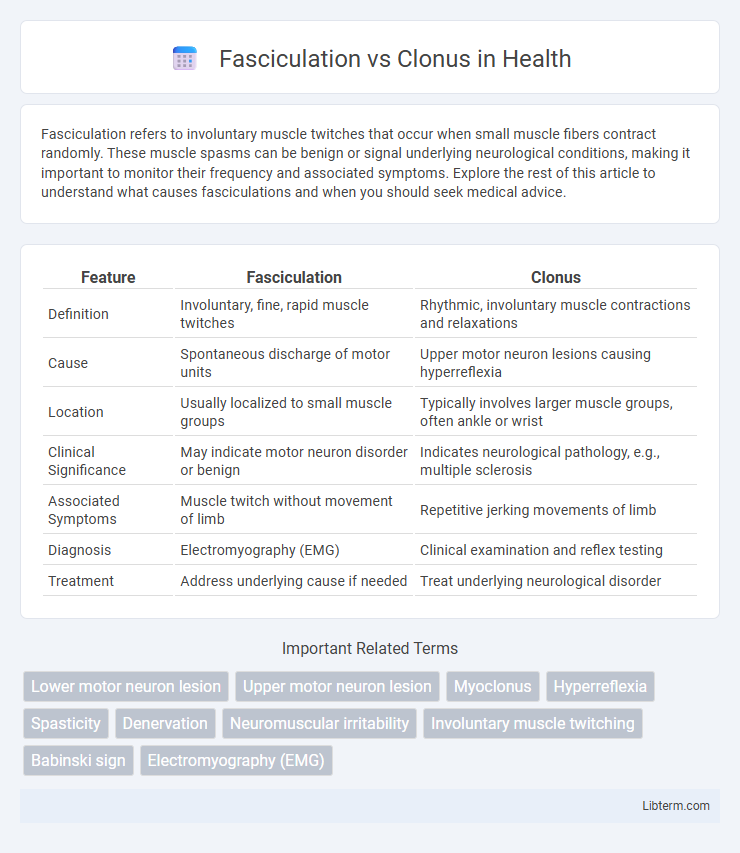Fasciculation refers to involuntary muscle twitches that occur when small muscle fibers contract randomly. These muscle spasms can be benign or signal underlying neurological conditions, making it important to monitor their frequency and associated symptoms. Explore the rest of this article to understand what causes fasciculations and when you should seek medical advice.
Table of Comparison
| Feature | Fasciculation | Clonus |
|---|---|---|
| Definition | Involuntary, fine, rapid muscle twitches | Rhythmic, involuntary muscle contractions and relaxations |
| Cause | Spontaneous discharge of motor units | Upper motor neuron lesions causing hyperreflexia |
| Location | Usually localized to small muscle groups | Typically involves larger muscle groups, often ankle or wrist |
| Clinical Significance | May indicate motor neuron disorder or benign | Indicates neurological pathology, e.g., multiple sclerosis |
| Associated Symptoms | Muscle twitch without movement of limb | Repetitive jerking movements of limb |
| Diagnosis | Electromyography (EMG) | Clinical examination and reflex testing |
| Treatment | Address underlying cause if needed | Treat underlying neurological disorder |
Introduction to Fasciculation and Clonus
Fasciculations are involuntary, fine muscle twitches caused by spontaneous firing of motor units, often visible under the skin and linked to peripheral nerve hyperexcitability. Clonus consists of rhythmic, involuntary muscle contractions typically triggered by sudden stretching of a muscle, indicative of upper motor neuron lesions or central nervous system pathology. Differentiating fasciculations and clonus helps in diagnosing conditions such as amyotrophic lateral sclerosis or multiple sclerosis by assessing respective neuromuscular and reflexive dysfunctions.
Defining Fasciculation: What Is It?
Fasciculation is defined as involuntary, spontaneous muscle fiber contractions visible as small, rapid twitches under the skin, typically caused by nerve irritation or damage. It differs from clonus, which is characterized by rhythmic, sustained muscle contractions resulting from neurological conditions affecting motor pathways. Fasciculations are usually brief, isolated movements, whereas clonus involves repetitive, oscillatory muscle contractions.
Understanding Clonus: Key Features
Clonus is characterized by involuntary, rhythmic muscle contractions and relaxations often triggered by sudden muscle stretching, commonly observed in neurological conditions such as multiple sclerosis or spinal cord injury. The most identifiable feature of clonus is its repetitive, oscillating movements, typically measured by counting beats during physical examination. Unlike fasciculations, which are irregular muscle twitches caused by spontaneous nerve discharge, clonus reflects hyperactive reflexes due to central nervous system lesions.
Causes of Fasciculation
Fasciculations are spontaneous, involuntary muscle twitches caused primarily by irritation or damage to peripheral nerves due to conditions like benign fasciculation syndrome, motor neuron disease, electrolyte imbalances, or medication side effects. Unlike clonus, which results from sustained muscle contractions linked to central nervous system lesions such as spinal cord injury or multiple sclerosis, fasciculations arise from abnormal firing of individual motor units. Understanding the underlying causes of fasciculations is crucial for differentiating them from clonus in clinical diagnosis.
Causes of Clonus
Clonus is caused by upper motor neuron lesions resulting from conditions such as stroke, multiple sclerosis, spinal cord injury, or traumatic brain injury leading to hyperactive reflexes. It occurs due to disrupted inhibitory signals in the central nervous system, causing repetitive, rhythmic muscle contractions. These involuntary muscle spasms distinguish clonus from fasciculations, which typically arise from lower motor neuron dysfunction or peripheral nerve irritation.
Clinical Presentation: Fasciculation vs Clonus
Fasciculations present as brief, spontaneous, involuntary muscle fiber twitches visible under the skin, often without movement of the limb, typically indicating lower motor neuron irritation. Clonus manifests as rhythmic, involuntary muscle contractions and relaxations, usually elicited by sudden muscle stretch, reflecting upper motor neuron lesions. Clinically, fasciculations are localized and fine, whereas clonus appears as repetitive, sustained jerking movements.
Underlying Neurological Conditions
Fasciculations are involuntary muscle twitches often linked to lower motor neuron disorders such as amyotrophic lateral sclerosis (ALS) and peripheral neuropathy, indicating localized nerve irritation or damage. In contrast, clonus is a series of rapid, rhythmic muscle contractions typically associated with upper motor neuron lesions, commonly seen in multiple sclerosis, stroke, or spinal cord injury. Recognizing the presence of fasciculations versus clonus can help differentiate between peripheral nerve disorders and central nervous system pathologies, guiding accurate diagnosis and treatment.
Diagnostic Approaches and Tests
Electromyography (EMG) plays a crucial role in differentiating fasciculations from clonus by detecting abnormal spontaneous muscle activity in fasciculations and rhythmic bursts in clonus. Nerve conduction studies complement EMG by assessing peripheral nerve function, helping to rule out neuropathic causes. Clinical examination remains essential, with fasciculations presenting as intermittent muscle twitches and clonus characterized by repetitive, involuntary muscle contractions often triggered by sudden stretch.
Treatment Options and Management
Treatment options for fasciculations primarily focus on addressing underlying causes such as electrolyte imbalances, anxiety, or neurological disorders, often involving magnesium supplements, antispasmodics, or anxiolytics. Clonus management typically requires addressing the root neurological condition with medications like muscle relaxants (baclofen or tizanidine), physical therapy to improve muscle control, and sometimes botulinum toxin injections to reduce hyperactive reflexes. Both conditions benefit from targeted diagnostic evaluation to tailor treatment plans and monitor symptom progression effectively.
Prognosis and Long-term Implications
Fasciculations, often benign muscle twitches caused by nerve irritation, generally have a favorable prognosis with minimal long-term neurological impact. Clonus, characterized by repetitive, rhythmic muscle contractions typically linked to central nervous system disorders, may indicate underlying serious conditions like multiple sclerosis or stroke, requiring ongoing medical management. Long-term implications of clonus can include muscle stiffness and functional impairment, whereas fasciculations rarely progress to significant disability.
Fasciculation Infographic

 libterm.com
libterm.com